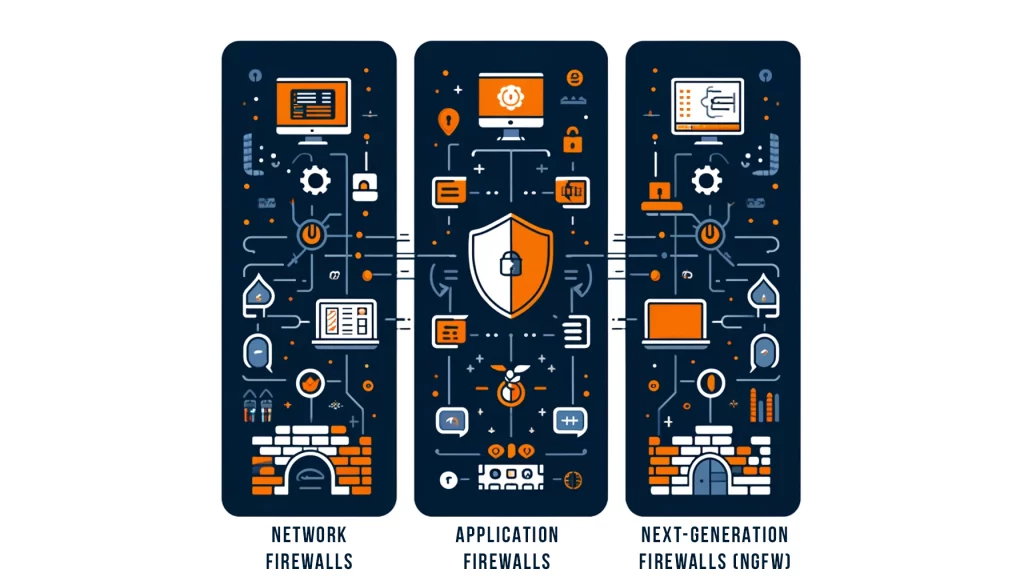
What are the Main Types of Firewalls?
In today’s interconnected world, where data breaches and cyber threats are on the rise, safeguarding sensitive information has become more critical than ever. As organizations strive to maintain the integrity and confidentiality of their data assets, implementing robust cybersecurity measures is paramount. Among the most fundamental tools in the cybersecurity arsenal are firewalls. In this comprehensive guide, we explore the main types of firewalls and introduce DataSunrise Database Firewall, a specialized solution for protecting databases from unauthorized access and data breaches.
Understanding Firewalls
Firewalls serve as the first line of defense against unauthorized access and malicious attacks by monitoring and controlling network traffic. They act as barriers between trusted internal networks and untrusted external networks, such as the Internet. Firewalls examine incoming and outgoing traffic based on predetermined rules and security policies, allowing or blocking data packets based on various criteria, including IP addresses, ports, protocols, and application-layer information.
Main Types of Firewalls

Network Firewalls. Network firewalls operate at the network layer of the OSI model and are typically deployed at the perimeter of a network. They inspect packets of data as they pass through network interfaces and enforce security policies based on IP addresses, ports, and protocols. Network firewalls can be either stateful or stateless, with stateful firewalls maintaining a state table to track active connections and ensure only legitimate traffic is allowed. Ideal for securing network perimeters, data centers, and branch offices. Suitable for organizations with a traditional network architecture.
This type of firewall is effective at blocking unauthorized access at the network perimeter, scalable and suitable for large-scale deployments. Also, it can be deployed inline without a significant impact on network performance.
But network firewalls also have bottlenecks. They have limited visibility into application-layer protocols and content and may require frequent updates to maintain effectiveness against emerging threats.
Application Firewalls. Application firewalls operate at the application layer of the OSI model and provide granular control over application-layer protocols, such as HTTP, FTP, and SMTP. Unlike network firewalls, which focus on packet-level filtering, application firewalls examine the content of data packets to detect and block specific application-layer threats, such as SQL injection attacks and cross-site scripting (XSS). Suitable for protecting web applications, APIs, and other application-layer services. Often deployed alongside network firewalls for layered defense.
Application firewalls are effective at blocking application-layer attacks and vulnerabilities. Also, they provide granular control over application traffic and protocols. But, such firewalls require thorough configuration and maintenance to ensure proper rule sets. Also, you need to remember that application firewalls may not be suitable for all network architectures or environments.
Next-Generation Firewalls (NGFW). Next-generation firewalls integrate traditional firewall functionalities with advanced security features, including intrusion prevention systems (IPS), deep packet inspection (DPI), and application awareness. NGFWs offer enhanced visibility and control over network traffic, enabling organizations to identify and mitigate sophisticated threats, such as advanced persistent threats (APTs) and zero-day exploits. Suitable for organizations with complex network environments and advanced security requirements. Often deployed in data centers, cloud environments, and perimeter networks.
Note, that such firewalls have complex configurations that may lead to misconfigurations and security gaps if not properly managed. Also, they require more processing power and resources, leading to potential performance impacts.
DataSunrise Database Firewall
DataSunrise Database Firewall is a specialized firewall solution designed specifically to protect databases from unauthorized access, SQL injection attacks, and data breaches. It acts as a transparent proxy between database clients and servers, intercepting and analyzing SQL queries in real-time. By enforcing granular access controls and dynamic data masking policies, DataSunrise helps organizations prevent unauthorized data access and leakage, ensuring compliance with data protection regulations such as GDPR, HIPAA, and PCI DSS.
Key Features of DataSunrise Database Firewall:
- Real-time SQL Analysis. Monitors and analyzes SQL traffic in real-time, detecting and blocking suspicious queries and anomalies.
- Access Control Policies. Enforces fine-grained access control policies based on user roles, privileges, and contextual factors to prevent unauthorized data access.
- Dynamic Data Masking. Redacts sensitive information dynamically based on predefined masking rules, ensuring that only authorized users see sensitive data.
- Auditing and Compliance. Provides comprehensive audit logs and reports for compliance purposes, facilitating regulatory compliance and internal security audits.
- Transparent Deployment. Seamlessly integrates into existing database infrastructures without requiring changes to application code or network configurations.
Conclusion
In today’s data-driven world, protecting sensitive information from cyber threats is paramount for organizations across all industries. Firewalls play a crucial role in defending against unauthorized access and data breaches by monitoring and controlling network traffic. By implementing the appropriate firewall solutions, organizations can establish robust defense mechanisms to safeguard their networks, applications, and databases. DataSunrise Database Firewall offers specialized protection for databases, ensuring that sensitive data remains secure and compliant with regulatory requirements. As cyber threats continue to evolve, investing in comprehensive firewall solutions is essential for maintaining data integrity and confidentiality.
